Don't wanna be here? Send us removal request.
Text
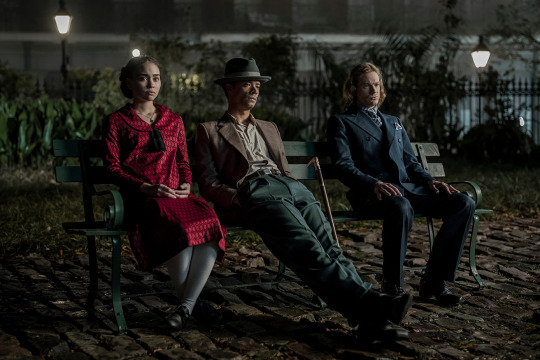
If Daddy Lou was already her favorite, Lestat’s attack has only caused Claudia to grow more “protective,” as Louis puts it. As he fades away to the “housewife” she always knew him to be, the bride Carpenter describes, essentially dropping out of his own narrative an episode before the finale, his new sister is ready. Early in the episode, Louis proclaims himself Claudia’s “knight,” yet it often feels like the roles are reversed. With the gift of “sensing trouble from a mile away,” Claudia is prepared, it seems, for every possibility. A sophisticated understanding of abuse stymies Lestat’s constant efforts to erase his attack. She seems to possess a preternatural understanding of Louis as well, knowing things about himself before he can even admit them to himself, and has since she first deemed him housewife. Treats you like shit and you take it, she told him then. Now, she sends commiserating images of Bruce, and escape routes, as Louis endures (to use a motif from this episode) sex with Lestat. You will enjoy killing him closes the episode. Throughout the last two acts of the season, Louis will take great, if unsubtle, care to ensure Claudia gets her due credit for saving his life. “It was a masterful month of preparation.” “Claudia used our advantage sparingly.” “Make no mistake, Claudia was plotting, quiet in her deer blind.” “There were plans to make, but the architect of those plans was—” “Claudia,” Daniel will interrupt, wearily. “Right. Cold, calculating, on a mission.” Yet beneath the lavish praise and heavy hand remain hints of darkness and an obsession with vampire lore. During their household meeting she presses Lestat for that lore, infuriated when he claims to know nothing. She shows particular interest in flying, refusing to accept it’s not a teachable skill. She’s been learning Romanian in her spare time, so it seems her plans to leave have not been fully abandoned. Nor has her spying on Lestat—which is treated almost like background noise, when it’s major, ongoing action that involves, and may offer insight into, two main characters.
Episode 6 Analysis: An episode before the finale, Louis drops out of his own narrative.
#iwtv#interview with the vampire#amc interview with the vampire#iwtv meta#iwtv analysis#iwtv review#louis de pointe du lac#claudia#claudia iwtv#lestat de lioncourt#daniel molloy
29 notes
·
View notes
Text
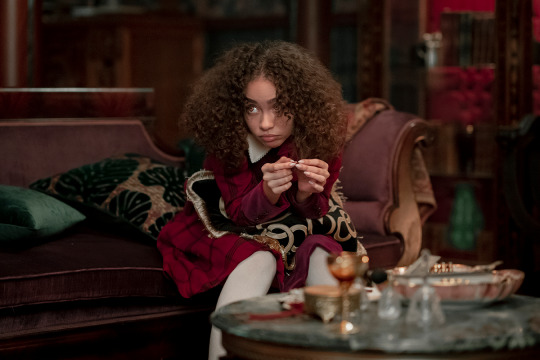
Over the seven years Claudia spends we don’t know where traveling who knows how, Louis sinks “underground.” Continued police suspicion demands caution but more than that he aches for his daughter, his light, his everything. When he isn’t, apparently, drinking and neglecting his housework, he is haunting Storyville and sending her “telepathic thoughts of remorse.” He tracks the series of student murders he’s convinced has to be her. He turns, as always, to books, Gustave Flaubert’s oeuvre among them. Flaubert was a master of realism: “the accurate, detailed, unembellished depiction of nature or of contemporary life. Realism rejects imaginative idealization in favour of a close observation of outward appearances.” A pointed reference in the episode that, basically, sends the show off the rails. It marks a turning point in the season, the tone of the show and each family member’s characterization. Fittingly, it comes to its ambitious, misguided head with another book: Chéri. Colette’s novel follows an aging prostitute’s long affair with a vain, fickle, domineering man. There’s a powerful attraction between them, though Léa denies it’s love for as long as she can, fearing Chéri will never return her feelings—and she is, unfortunately, correct. Chéri abandons his new wife for her, spends a passionate night with her, makes Léa admit he’s the “love of her life” and think they’re going to spend the rest of their lives together—only to waltz out of her home the next morning like an “escaped prisoner,” leaving Léa humiliated, heartbroken and alone. The reference is a potential goldmine of insight into Louis’s insecurities with Lestat (especially once Lestat becomes unfaithful), though I think there’s another reason we open 1.05’s final sequence on this particular book title, and will soon hear it spoken for the first—and only—time. We’ll seem to get “Lou,” another one-off nickname, a few minutes later. An explosive, principally, carefully offscreen fight will follow; bones break and mend overnight while cuts take months to heal; neighbors are unfazed when two men physically demolish an exterior wall; a cloud gift requires zero effort when expelling a group of soldiers from their home made Lestat bleed out his ears. It is, in short, a mess, and if it’s not by design it is wildly inept.
Episode 5 Analysis: The risk I took was calculated, but man, am I bad at math.
#iwtv#interview with the vampire#amc interview with the vampire#iwtv meta#iwtv analysis#iwtv review#claudia#claudia iwtv#louis de pointe du lac#lestat de lioncourt#daniel molloy#armand
34 notes
·
View notes
Text

Though we’re supposed to be getting Claudia’s perspective, I’m not sure how often we actually do—or, maybe, how often that perspective centers herself. She rarely mentions her life in Storyville. She doesn’t care Louis played a part in ruining it. She has no qualms whatsoever about accepting a pair of strangers as her new parents, to the point of sharing a bed with one of them. We don’t know her last name. As we said in 1.02, it’s not so much an issue of characterization as execution, and what can sometimes feel like a lack of curiosity into Claudia. You could, for example, argue that Claudia doesn’t dwell on her life in Storyville because she grew up in an abusive environment. But we never see any struggle or choice, and only know about the abusive environment from less than a handful of lines. Likewise, to call 1917 to 1921 one of the biggest transitions of her life is an understatement; it’s no longer even life. Yet the only times there are problems, she writes, are when Louis and Lestat butt heads, and Claudia must resolve them, likening herself to a buffer in a statement that goes deeper than she realizes. What are her thoughts on jumping from abject poverty to endless luxury? How did she adjust to suddenly having zero friends? How did she handle that for four years? What are her feelings on her mother? If she has none, why not? Much like with Louis, it’s presented almost as though a chapter’s been firmly shut on the Storyville portion of her life. It will only get worse as the season goes on and we are denied her feelings on events including her own rape, and her role in the narrative becomes “savior.”
The show’s actual best dressed, Claudia probably not de Pointe du Lac definitely never de Lioncourt, has arrived.
#iwtv#interview with the vampire#amc interview with the vampire#iwtv meta#iwtv analysis#iwtv review#claudia#claudia iwtv#iwtv claudia#louis de pointe du lac#lestat de lioncourt
51 notes
·
View notes
Text
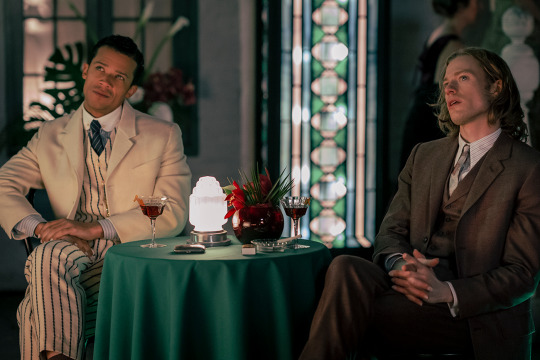
It was a “mighty tall ladder” to climb, but life at the top is truly as good as Louis always imagined. Under his ownership the Azalea has become the “brightest club in the district.” It’s successful enough to continue providing his loyal, beloved employees generous salaries. And on top of star performer Jelly Roll Morton, they just hired a new singer who heard about the place “all the way in Atlanta. They talking about this place in Atlanta!” “1917 sounds like it was a pretty good year,” Daniel agrees. Tensions even appear to have cooled with Lestat; in contrast to the frightening scene that closed the previous session, this one opens on a midnight date in Jackson Square, before Louis takes his nightly victory lap at the Azalea. It’s reminiscent of their early courtship, playing docent to the new, mysterious gentleman in town—save for one key difference. Two sessions ago Jackson Square meant comfort, an opportunity for Louis to shed his armor and share himself with someone other than Paul; now he and Lestat sit in silence. It appears the tenor’s death is still weighing on Louis, even after half a year. Humiliation. Complicity. A lifetime of joy destroyed in half an hour. The fear that stopped him from objecting in the parlor no longer factors. “The poets, composers. . . . Shouldn’t we spare them the randomness of our killing?” It’s Lestat’s turn for disinterest. No one knows better than he, after all, that if you “thrust [any human] into circumstance, whisper to them their Lord, God and Savior is not listening . . . you will see all kinds of depravity.” Nonetheless, a rare and well placed “mon cher” gets him off the bench and testing Louis’s theory. He has some questions of his own, as they stroll through Storyville. How do we decide who’s bad enough? How long do we wait to confirm they are? “Say we come upon a murderer planting a flowerbed, thinking only of flowers.” A thief finally meets Louis’s requirements; Lestat prepares the victim before they can dawdle any longer. Louis, faced with exactly what he claimed he wanted, grabs the nearest cat instead.
Pivoting: last-ditch effort or sound business strategy?
#amc interview with the vampire#interview with the vampire#iwtv#iwtv analysis#iwtv meta#louis de pointe du lac#lestat de lioncourt#daniel molloy#claudia#claudia iwtv
40 notes
·
View notes
Text
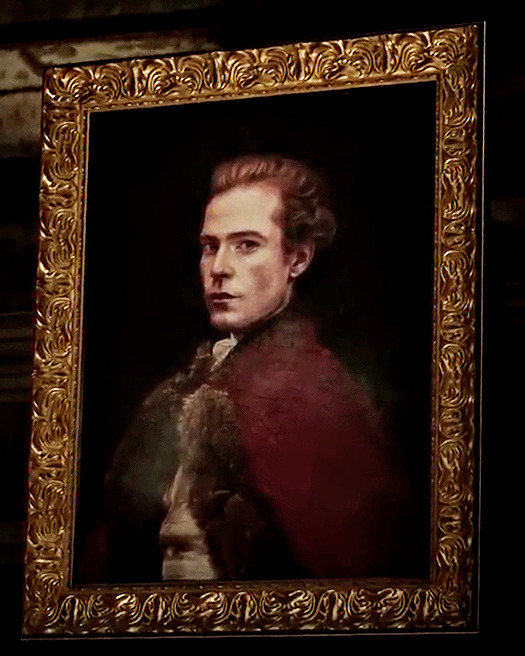



Lestat de Lioncourt, Interview with the Vampire (2022) William Fermor, Pompeo Batoni, Italian, 1758 Olivier Journu (1724–1783), Jean-Baptiste Perronneau, French, 1756
#interview with the vampire#iwtv#iwtv amc#lestat de lioncourt#amc interview with the vampire#who commissioned it#and why 🔍#¯\_(ツ)_/¯
476 notes
·
View notes
Text

Louis’s plotting this episode, much like Lestat’s hand in the last, is incomprehensible; to be fair, he’s obviously yet to recover from last session’s meltdown, and to his credit, he gathers himself enough to apologize to his guest. He emerges from the bowels of his penthouse halfway through dinner, a portrait of remorse in his second most shapeless outfit, to music, and assures Daniel that his sickening display of one single tear will never be repeated. He keeps to his word. The wracked, awestruck, trembling Louis we left sprawled on the altar, much like the Louis who was moved close to tears by the opera, is gone as soon as session two starts, along with any vestiges of a wedding. Lestat strips and swaggers, Louis watches in slowly mounting horror and it feels more like strangers, or some one night stand going wrong, than two hearts just synced as one—sort of the same way Louis wanted to treat their first night. Incredibly, Louis follows these visuals by telling Daniel: “To satisfy your fixation, being transformed by Lestat . . . bedding down with him, was an overture of sorts to that side of my nature.” Overture means prologue, “an introduction to something more substantial;” he’ll also contend that “the earth beneath me always felt liquid.” Bold claims to make when we can count on one hand the number of times we’ll see them embrace in almost 30 years. His “apprenticeship” is a similar letdown. Lestat liked to dangle vampiric knowledge before him like a carrot, Louis suggests, such as the ability to read minds. The scene ends on a strategic “beg,” hoping Daniel’s and our attention will hang on that, and I don’t necessarily dispute it, but it does take me back to the insane unresolved vampire stuff from 1.01, like how a man sank Kangal fangs into Louis’s body and physically pulled blood, and the only issue Louis had was people would gossip. He witnessed Lestat stop time and hold his brother under some kind of hypnosis and said not during dinner. We can read minds? makes me think he’s in my head makes me wonder if telepathy should be such a leap, especially when he’d spend part of their dates grilling Lestat about his “tricks.” In time, Louis. Patience, Louis.
Facing eternity with Lestat, Louis reenters the workforce.
#interview with the vampire#amc interview with the vampire#interview with the vampire amc#louis de pointe du lac#lestat de lioncourt#daniel molloy#armand#iwtv analysis#iwtv review#iwtv meta
37 notes
·
View notes
Text
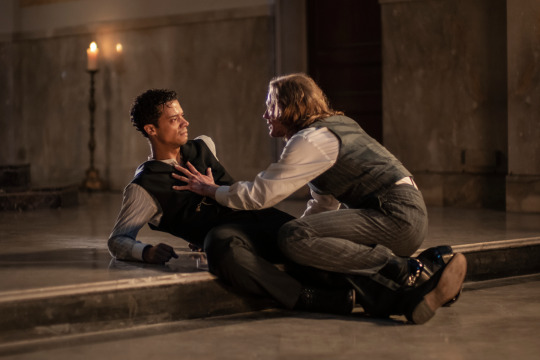
Art stages the scene in Louis’s “coffin,” as he refers to the Dubai penthouse, but when it comes to his life the references are literary, and none too subtle. A Doll’s House is attended as he’s trapped in an oppressive, offscreen marriage, inviting his audience to draw their own parallels. Flaubert and Chéri draw our attention to a sudden shift in tone, and a never-heard nickname, at the turning point of the season. The less said about On Marriage the better. These references serve as clues and markers, shaping his story, guiding his audience, which makes his first one, the opera Iolanta, so interesting. It feels most organic, almost a slip, considering its content. It’s about “a princess who didn’t know she was a princess,” and moved Louis to tears. Iolanta, who is blind, lives a pampered life in a tower. Her father hopes she’ll never have to realize she’s disabled, but eventually she does learn about sight from a stranger who wanders into her garden. They fall in love, and it’s to save his life that she submits to magic to gain vision. She recoils from the world once she does. Sights are disturbing and the people she thought she knew alien. Her new gift, born of trauma, isn’t a gift at all. The link to Louis is obvious, especially as we’ll watch him grapple with his new state of being throughout the rest of the season. He received his own “gift” that wasn’t a gift: he was unsuited to it, a failure, “botched,” will spend three mostly miserable decades in New Orleans, lose the only person that made those decades worth it and even now lives like Iolanta, trapped in another tower, symbolically in darkness: surrounded by torn diaries, distorted fragments of the past, feeding another fantasy to a person he pays to listen; severed from his favorite hobby, in poor mental health, in a potentially dangerous environment. . . . Iolanta’s story, however, doesn’t actually end in that tower. Though her early life was one of luxury, it was also extremely isolated and depressing. She was never truly happy (she believed her eyes were “only for crying”) and despite her father’s efforts was cognizant of missing something other people had. And though her sight was gained through terrible circumstances, and the world seemed overwhelming at first, by the final lines of the play she has come to understand and embrace her new life. She abandons “darkness” for “light” and love. For Iolanta, the trick was understanding her transformation couldn’t only be physical. Two worlds make up creation, according to her physician, “that of the flesh and that of the spirit.” Until she accepted the two went hand in hand, that “the notion of sight is not just of the flesh,” no real change was possible, and light would never penetrate her darkness. Be all the beautiful things that you are, Lestat asked as he and Louis knelt at the altar, and be them without apology.
In AMC’s Interview with the Vampire, the plot holes are the point. (We hope.)
#interview with the vampire#amc interview with the vampire#louis de pointe du lac#lestat de lioncourt#daniel molloy#iwtv review#iwtv analysis#interview with the vampire review#interview with the vampire amc
147 notes
·
View notes